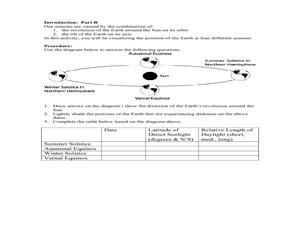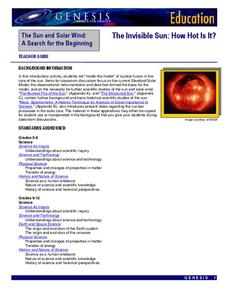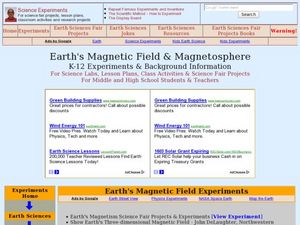Curated OER
Hello, Sunshine!
Students investigate how the sun travels across the sky at different latitudes using Solar Motion Demonstrator. In this earth science lesson, students explain why seasons change. They study how the tilt of the Earth's axis affects...
Curated OER
Blazing Gas
Fourth graders read and discuss the sun and the energy we use on Earth from the sun. In this sun lesson plan, 4th graders discuss the solar system, planets, and answer short answer questions.
Curated OER
Suns Path and Seasons
Using a plastic dome to represent the hemisphere of the sky, your class is able to demonstrate the path of the sun at different points of the day and year. They use a protractor to record movement and answer questions about...
Curated OER
View of a Comet from Earth
Learners investigate comets. In this space science lesson, students study overhead transparencies of the orbits of Earth and a comet. Learners identify various locations and times where comets would be visible from Earth.
Curated OER
Reason for the Seasons
Young scientists examine why we have seasons on Earth, and how the motion of the Earth around the Sun causes them. Groups of learners are given a variety of balls, a bamboo stick, a marker, and a flashlight, then use the objects to...
Curated OER
Energy from the Sun
In this energy from the sun worksheet, students are given 20 terms to complete sentences about the sun, the energy of the sun, the radiation of the sun, the transfer of energy from the sun and the currents created by the energy of the sun.
Curated OER
Seasons on Earth
Students engage in a multimedia study of the seasons in relation to the sun's angle of incidence on the Earth as it is tilted on its axis. They interpret satellite maps of the world as they show seasonal changes in plant life.
NASA
The Invisible Sun: How Hot Is It?
It's getting hot in here! The first in a series of six lessons has learners model nuclear fusion with a simple lab investigation. Groups collect data and analyze results, comparing their models to the actual process along the way.
Curated OER
Season Worksheet #5
Sunrise, sunset, swiftly fly the years! Your earth scientists can also fly through a year of daylight data. They analyze a graph and then answer five multiple choice questions about the rising and setting of the sun, the total number of...
Sunburst Visual Media
Clouds
Support science instruction with a combination of engaging activities and skills-based worksheets that focus on clouds. Learners take part in grand discussions, write an acrostic poem, complete graphic organizers, solve word...
MENSA Education & Research Foundation
The Moon: Earth’s Dependable Neighbor
Scholars become experts on the moon, its phases, and craters with a series of lessons, activities, and extension opportunities. Learners' expert level of knowledge includes moon facts, how moon craters are created, the ability to...
National Wildlife Federation
What's Your Habitat?
How are third graders like rabbits? They both live in habitats and require food, water, and shelter to survive! An educational science activity encourages your learners to think about their own habitats and survival needs, before...
Curated OER
The Reasons for the Seasons
Young scientists use a globe and a light to simulate the rotation of the earth and sun to show the seasons. Additionally, they simulate direct sunlight and indirect sunlight showing intensity of the sun, and answer questions based...
Astronomical Society of the Pacific
Getting Ready for the All American Eclipse!
Give your pupils a front row seat at the biggest light show in the sky this year! In addition to admiring the total solar eclipse, young astronomers can explain the phenomenon with a little help from an inquiry-based instructional...
Curated OER
Galaxy Adventure
Working in groups, learners create a mnemonic device, give an oral presentation, and create a pictorial representation of the correct sequence of the planets and asteroid belt from the sun. An assessment rubric is included in the lesson.
Curated OER
What Makes Day and Night?
In this What Makes Day and Night worksheet, students explain what makes day and night by looking at pictures of the earth and sun and reading 11 related words. Students also write interview questions for a scientist and investigate day...
Curated OER
Science Trail
Young scholars explore the solar system by conducting Earth science experiments. In this Sun lesson, students identify the different seasons on Earth and discuss their purpose and cause. Young scholars create a sundial and observe the...
Curated OER
The Sun
In this earth science worksheet, 3rd graders go outside on a day that has both sun and clouds. They explain, without looking at the sun, how they can tell when the sun is hidden by clouds. They look at pictures that show the sun shining...
Curated OER
Hello Sun, Goodnight Moon
Students become familiar with different times around the world through the reading of 9 O'clock Lullaby. In this Earth, sun, moon lesson, students recognize the movement of the Earth and the relationship to the sun and the...
Curated OER
The Four Seasons - Earth's Axis
Learners explain that it is the tilt of earth's axis that causes the seasons. They engage in a variety of activities, both teacher-led and on the computer, which enable them to further explain how the Earth's axis affects the seasons.
Curated OER
Follow the Sun
Students use a simple model of the Earth and Sun as seen from space to explore the sun's apparent movement across the sky over the course of a day and year. They consider the apparent direction of movement and changes in the sun's angle.
Curated OER
Microbial Influence on Earth's Systems
Students identify the different biogeochemical cycles on Earth. In this biology lesson, students observe microbes under a microscope. They compare and contrast respiration and photosynthesis.
Curated OER
Earth's Magnetic Field and Magnetosphere
Students investigate the magnitude of Earth's magnetic field using PASCO. In this physics lesson, students describe the features of the magnetosphere. They explain how atmosphere layers protect the Earth.
Curated OER
How Does the Sun Seem To Move?
In this sun learning exercise, students will fill in the blank of 3 statements about observing the movement of the sun. Then students will fill in the blank of a conclusion they develop from the facts. This learning exercise is a graphic...

























